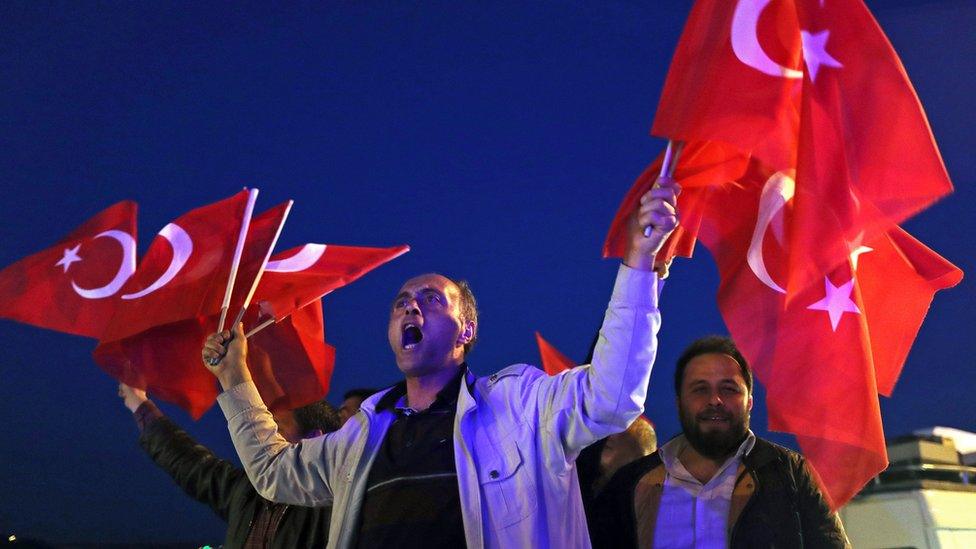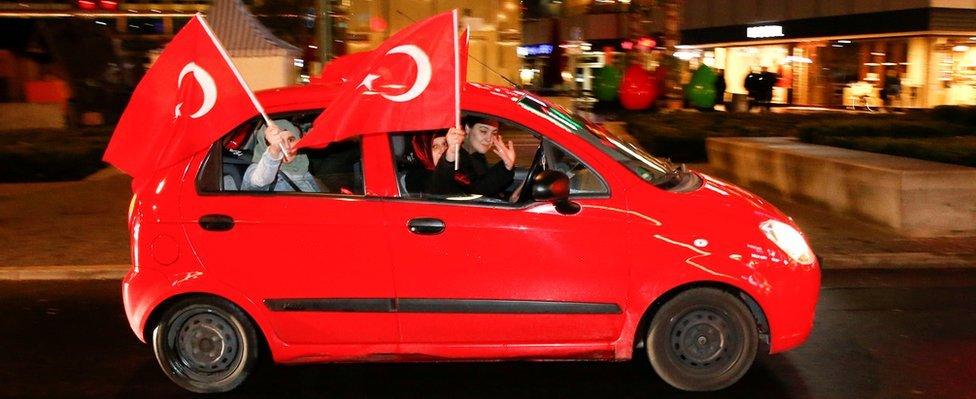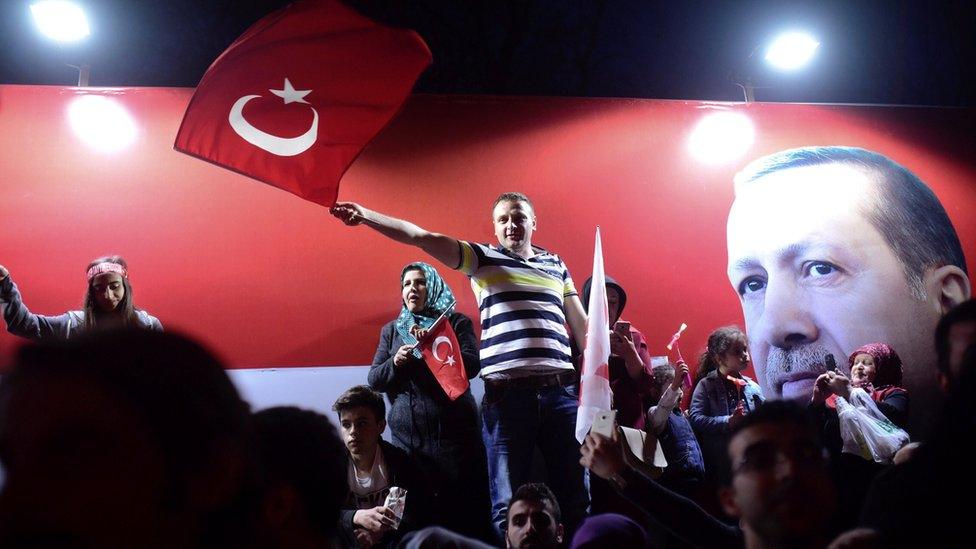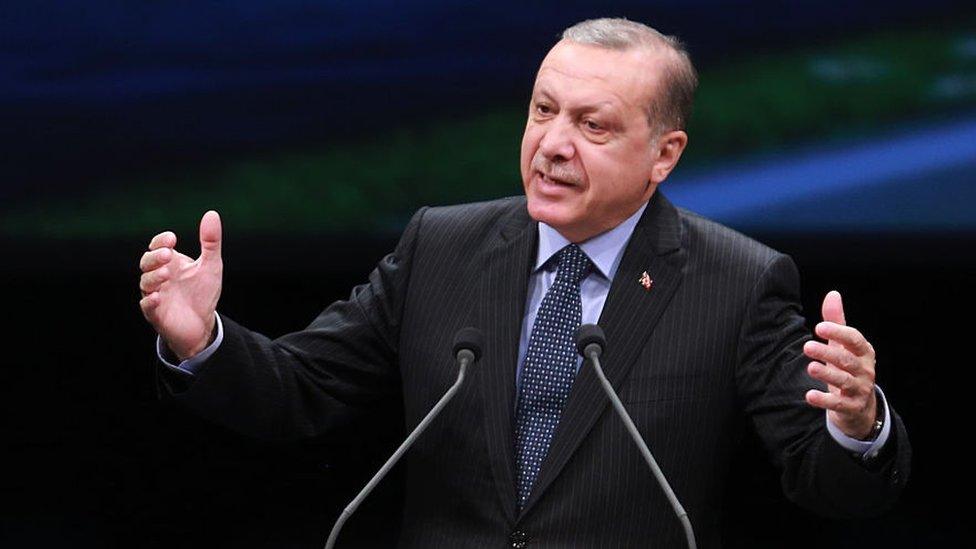Turkey referendum: Key reactions
- Published

President Erdogan's supporters are celebrating on Istanbul's streets
Turkey is divided between those who are celebrating a win in a national referendum, and those demanding a recount.
President Recep Tayyip Erdogan has claimed victory in the vote, which looks set to grant him sweeping new powers.
But international observers have highlighted an "unlevel playing field" and critics have warned it closes the door on Turkey's faltering bid to join the European Union.
The president
President Recep Tayyip Erdogan: "Decision made by the Turkish public is historic moment"
President Erdogan said in his victory speech that Turks had voted for "not just an ordinary or simple change".
"This is the first time in Turkish history that the Turkish people have cast their votes on such an important constitutional change.
"In the past it was the parliament who actually decided whether to make any constitutional changes but today, for the first time, the will of the people has shown through this referendum and this is the first time in our history and very important."
He also said voters abroad were a big part of the success. "We would like other countries and institutions to show respect to the decision of the nation," he added.

The opposition

The main opposition, the Republican People's Party (CHP), called for a recount, its deputy leader Bulent Tezcan denouncing "violations" in the electoral process involving one-and-a-half million unstamped ballot papers. The party produced footage apparently showing election officials stamping ballot papers after counting began.
"We will pursue a legal battle. If the irregularities are not fixed, there will be a serious legitimacy discussion," said Mr Tezcan.
The pro-Kurdish Peoples' Democratic Party (HDP), which has had two of its leaders imprisoned under President Erdogan, said the result would not be legitimate until an appeal was finalised.
"Our co-chairs being jailed, the referendum being held under a state of emergency, and other oppressive measures cast a shadow and legitimacy problem over the vote," HDP spokesman Osman Baydemir told reporters.
Exiled Erdogan critic Can Dundar, ex-editor in chief of Turkey's Cumhuriyet newspaper, told Germany's Die Welt, external that this would be a Pyrrhic victory that marked "the beginning of the end of the Erdogan era". Even with a media that had almost exclusively backed a Yes vote the majority was still so tiny, he said.
The ultranationalists

The opposition Nationalist Movement Party (MHP) had internal fights over the referendum and expelled a rebel member, Meral Aksener, who became a leading "No" campaigner.
Leader Devlet Bahceli, who led the party's push for "Yes", said the result was an "undeniably successful achievement" and should be respected, according to Reuters news agency.
Ms Aksener is disputing the result.

The observers
Some of the most damning criticism came from the small team of international monitors, which complained of an "unlevel playing field".
"In general, the referendum did not live up to Council of Europe standards," said Cezar Florin Preda, head of the Council's Parliamentary Assembly delegation.
Under Turkey's state of emergency fundamental freedoms were curtailed
The state did not ensure that voters received impartial or balanced information
The 18 proposals were not listed on the ballot but reduced to a Yes or No
Senior officials equated No supporters with terrorist sympathisers
Arrests of journalists and media closures led to widespread self-censorship

Reaction outside Turkey

Turkish voters in Berlin celebrated the result but reaction elsewhere in Germany was more critical
While the margin of victory within Turkey was small, a far larger 59% of Turks voting abroad supported boosting the president's powers.
In Germany, which has the EU's biggest Turkish community, 63% voted Yes. German Chancellor Angela Merkel, in a joint statement with Foreign Minister Sigmar Gabriel, warned that the "tight referendum result shows how deeply divided Turkish society is and that means a big responsibility for the Turkish leadership and for President Erdogan personally".
Elmar Brok, the German head of the European Parliament's foreign affairs committee, said the result did not legitimise a complete overhaul of the state. And the president of Germany's Turkish community, Gokay Sofuoglu, said parties and organisations within Germany had to "find ways of better reaching people who live in freedom in Germany and yet want autocracy for people in Turkey".
The US President Donald Trump called Mr Erdogan "to congratulate him on the success of the referendum", the state-run news agency Anadolu reported citing unnamed sources.
Door to EU 'well and truly shut'
Austrian Foreign Minister Sebastian Kurz said the result was a "clear signal against the European Union". The "fiction" of Turkey's bid to join the bloc must be ended, he said. Julia Klöckner, a leading voice in Angela Merkel's German CDU party said the door to EU accession was "well and truly shut" and called for billions of euros in contributions to finance Turkey's bid to stop.
The European Commission, external urged Turkey to seek "the broadest possible consensus" in implementing changes. It pointed to "alleged irregularities" in the vote and said it was awaiting the assessment of international observers.
In claiming victory, President Erdogan said he would review Turkey's suspension of the death penalty. That would not only bring an end to Turkey's faltering bid to join the EU but bring it into conflict with the Council of Europe's aim of abolishing capital punishment.

The French president's office warned that any referendum on reviving the death penalty would "obviously be a break with values and engagements" that Turkey had accepted in joining the Council of Europe. The president of the European Parliament, Antonio Tajani, tweeted his own concerns.
The pan-European human rights body of which Turkey is a member said it was "of utmost importance to secure the independence of the judiciary in line with the principle of rule of law enshrined in the European Convention on Human Rights". The council is a distinct entity and is not a branch of the European Union.
- Published16 April 2017

- Published16 April 2017
